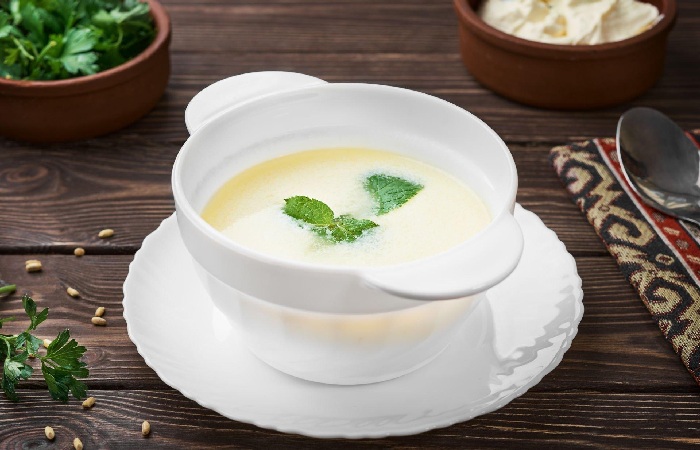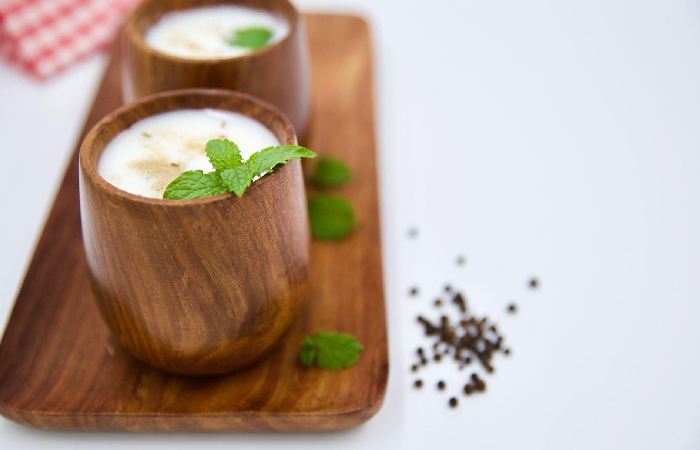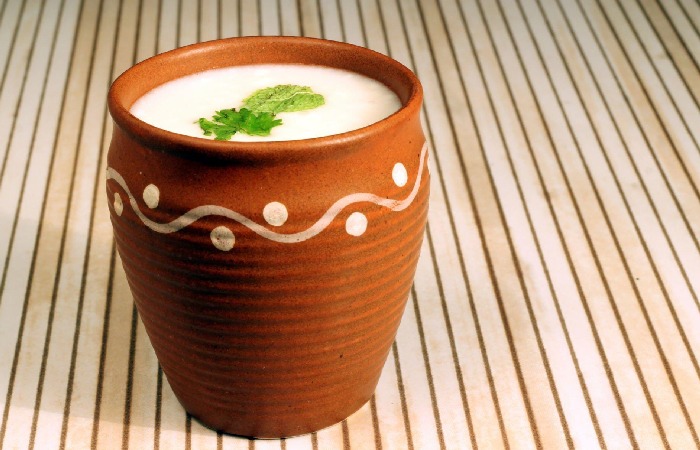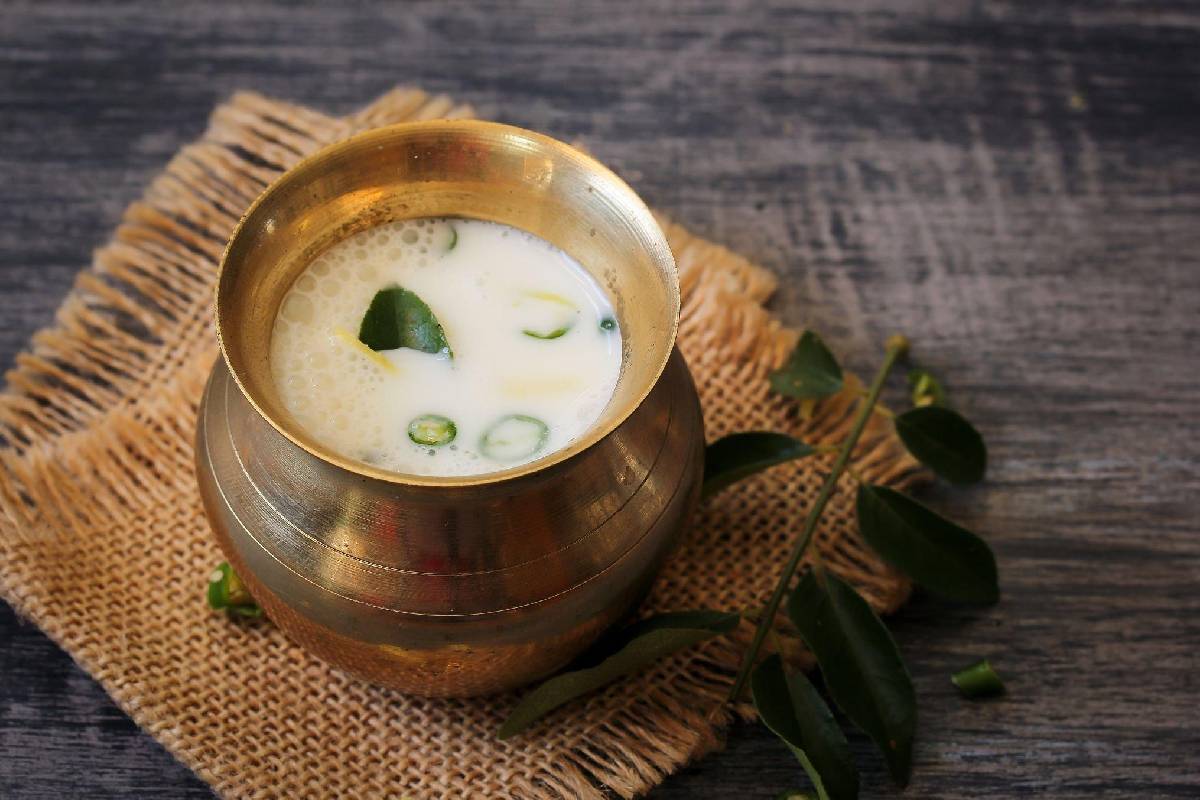Table of Contents
Introduction
Wellhealthorganic.com:do-you-know-12-benefits-of-drinking-buttermilk-daily – In India, buttermilk is a standard beverage, and for a good reason—it has incredible health advantages. Even ancient Ayurvedic scriptures advise frequently consuming buttermilk.
Buttermilk, or chaas in Hindi, is a preferred summertime beverage in North India. Buttermilk has several advantages in addition to being tasty and portable.
A glass of buttermilk can be helpful for you whether you are lactose intolerant, aware of your weight reduction, or experiencing “blood pressure issues.” As Indians, we enjoy drinking buttermilk or chaas, but it might be challenging if you live in Dubai. The most excellent Indian restaurant in Dubai, Amritsar Restaurant, is where you can find Chaas.

Today’s dairy byproduct is healthful and beneficial.
Many people think that buttermilk is a mixture of milk and butter, but it is not. When the curds are stirred, the butter separates and what is left is called buttermilk. Buttermilk is found in most Indian households and is consumed daily with or after meals. The buttermilk recipe also includes a few spices like cumin powder, black pepper, ginger, green chilies, curry leaves, and coriander leaves. All of these factors enhance the taste and medicinal properties of buttermilk.
Even while buttermilk seems like a high-fat beverage, it isn’t. Milk left over after producing butter is initially used to make buttermilk. By turning the fat in milk into butter, churning removes the fat. The churning procedure made the milk in the churn somewhat sour and packed with microorganisms that are surprisingly beneficial to human health. The end product was a protein-rich, multipurpose liquid that was excellent for baking.
Buttermilk has been used by dairy producers for millennia and is now regarded as a beneficial and healthful dairy byproduct.
Information On Nutrition
Cultured 1% buttermilk at a serving size of one cup contains:
- the 110 calories
- protein in 9 grams
- A 3 gramme fat
- carbs in 13 grammes
- 1 gramme or less of fibre
- sugar in 12 grammes
Buttermilk excellent source of protein needed to develop strong muscles, skin, and bones. The majority of buttermilk sold today is now fortified with additional vitamins and minerals, including:
- A vitamin
- Nutrition D
- Calcium
- Potassium
- Phosphorous
- Riboflavin
- Probiotics
Buttermilk’s Potential Health Benefits Wellhealthorganic.com

The bacteria, vitamins, and minerals in buttermilk provide many significant health advantages. For instance, vitamin A in fortified buttermilk plays a substantial role in maintaining the health of your eyes. Due to their critical role in maintaining the health of your retinas, vitamins A and other members of the retinoids vitamin family include vitamin A. Additionally, vitamin A improves your immune system and maintains the health of your kidneys, lungs, and heart.
Describe Buttermilk.
Since buttermilk doesn’t contain any butter, the name might be deceptive. The liquid left after whole milk is transformed into butter is used to make traditional buttermilk.
It is a typical healthful beverage that is well-liked throughout various North Indian locations. One of the leading health advantages of buttermilk is its high acidity, which prevents the growth of unwelcome germs because of lactic acid.
Because lactose, the primary sugar in milk, is present and fermenting its lactic acid, it also gives it a sour flavor. Compared to ordinary cow milk, buttermilk is thick, and the bacteria present releases the pH level of this beverage decreases as lactic acid. In addition, casein, the main protein in milk, solidifies.
The Following Health Advantages Of Buttermilk Or Chaas

Decreases Acidity
One of the significant advantages of chaas is that it reduces acidity because it is made of yogurt. You must start drinking buttermilk if you frequently get acid reflux after meals.
After meals, a buttermilk glass can help digestion and reduce acidity. Some additional seasonings, such as dried ginger or pepper, may enhance its qualities even more, and it could lessen acid reflux-related stomach lining irritability.
Promotes Constipation
Another all-natural solution for preventing constipation and associated issues is buttermilk. Due to its high fiber content, buttermilk can help with bowel movements and can soothe some conditions.
Body Coolant Made Naturally
Buttermilk is quite cooling to our bodies and is refreshing. In the sweltering months of April through July, a glass of buttermilk garnished with cumin seeds, mint, and salt does wonders to satisfy our thirst and chill our bodies.
It makes an excellent substitute for the chemical-fill cold drinks readily accessible on the market and may also topped with ice cubes.
Women experiencing hot flashes after menopause may find relief by drinking buttermilk.
Stops Dehydration
Curd and water combined to create buttermilk. About 90% is made up of water and electrolytes like potassium. As a result, buttermilk effectively maintains the body’s water balance and guards against dehydration.
Beneficial to Our Digestive System
Our digestive systems benefit significantly from buttermilk. Buttermilk’s beneficial bacteria and lactic acid aid in digestion and boost metabolism.
Additionally, it aids those who experience constipation and helps maintain regular bowel motions. Besides helpful in treating Irritable Bowel Syndrome is buttermilk (IBS) Wellhealthorganic.com . Additionally, it aids in the prevention of colon cancer, lactose intolerance, and stomach infections.
Increases Energy
It gives you additional energy and keeps you moving all day. Buttermilk contains riboflavin, a B vitamin essential for your body’s processes for producing energy. The amino acids that form up proteins in your body also better controlled by it.
Healthy for teeth and bones
A good source of calcium is buttermilk. About 116 mg of calcium may be found in 100 ml of buttermilk.
A healthy skeletal system requires calcium. It strengthens our teeth and bones. Degenerative bone disorders like osteoporosis are prevented by calcium. Additionally, calcium is necessary for a heartbeat, muscle contraction, and blood clotting.

